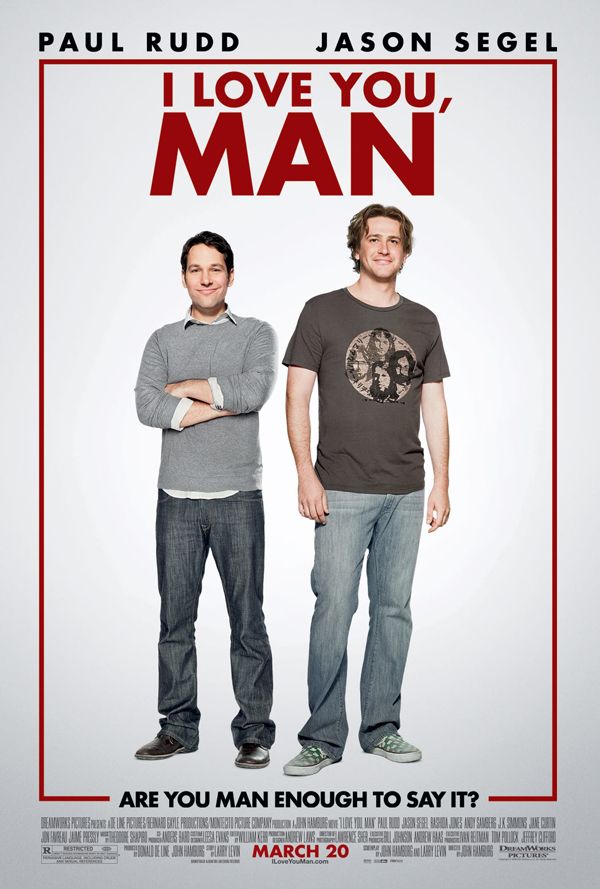 Paul Rudd, a reliable supporting comedic actor for more than a decade, continues his transition to leading man in the very funny “I Love You, Man.”
Paul Rudd, a reliable supporting comedic actor for more than a decade, continues his transition to leading man in the very funny “I Love You, Man.”“I Love You, Man” is the latest in the recent trend of films being termed bromances. These are films that take the outrageous frat boy humor of films like “Old School” and “Anchorman” and graft it on to a romantic comedy structure. Just as much, if not more, time is spent with the male lead hanging with his guy friends as courting the female lead.
Writer, director and producer Judd Apatow (“Knocked Up”) is responsible in some way for the vast majority of these movies, which play to a large cross-section of moviegoers because the sweetness and positive values buried at their core counterbalances the coarser, low-brow humor.
“I Love You, Man” takes the concept of a bromance and runs with it. This time the central relationship is the male one. Rudd stars as Peter, who after proposing to his finance (Rashida Jones, “The Office”) realizes he has always only had female friends and begins a quest to find a guy friend to be his best man.
Peter goes on a series of failed man-dates until he meets Sydney (Jason Segel, “Forgetting Sarah Marshall”) and they instantly hit it off despite, or because of, the fact that they are opposites. Peter is repressed and painfully awkward while Sydney is the sort of free spirit who justifies not cleaning up after his dog because it is good for the environment.
The film has their relationship go through all the romantic comedy clichés: the meet cute, the first few dates, and the inevitable break up over a misunderstanding followed by the even more inevitable reconciliation. Some may complain this makes the film predictable, but having the platonic male relationship play as a romantic one yields laughs as familiar conventions are tweaked.
John Hamburg, the writer of “Meet the Parents” and “Meet the Fockers,” co-wrote and directed the film. After being stuck in PG-13 world, Hamburg seems to be liberated now that he is in the R-rated realm.
Hamburg is dealing with the same sort of humor that made the “Meet” films popular, but here it seems less forced and more sincere. A lot of that has to do with Rudd and Segel, who both have a natural ease on screen and an inherent likability.
Rudd makes Peter’s awkwardness sublimely funny, but never to the point of being annoying. Watching him desperately try to be nonchalant and cool by making up nonsensical nicknames and expressions gets big laughs, but it is a credit to Rudd’s performance that he has the audience rooting for him.
Segel is also very good here. His Sydney could have come up off as obnoxious or grating, but like Rudd’s performance, he emanates a sweetness. Segel and Rudd have a great comedic chemistry together that is easygoing and fun. Much of the film is them just hanging out, which could drag except we enjoy spending time with these guys.
It isn’t just their show. The film is populated by a good supporting cast including Jon Favreau (“Four Christmases”) and Jamie Pressly (“My Name is Earl”) as a bickering couple, and J.K. Simmons (“Juno”) and Jane Curtin (“3rd Rock from the Sun”) underused as Peter’s parents.
Andy Samburg (“Saturday Night Live”) amuses in a low-key performance as Peter’s gay brother that busts all the gay stereotypes. Then there is Lou “The Hulk” Ferrigno playing himself. He is worked into the movie because Peter is a Realtor selling Ferrigno’s house, but whatever the excuse it is cameo that could’ve been gimmick that turns out to work.
Rashida Jones’ finance character is underwritten, but she’s very good here and thankfully isn’t written or played shrill. We like her and want Peter to be with her. Jones, in her first major film role, is funny and warm, and it will be interesting to see what she does with a bigger role.
“I Love You, Man” offers further prove that its leads are two of the funniest comic actors working today, and that should be enough to warrant seeing it. Thankfully, the movie holds together quite nicely as a whole.
 Mickey Rourke may not have won the Oscar for Best Actor for his astounding performance in “The Wrestler” but he won nearly every other major film award including the BAFTA, the Golden Globe and the Independent Spirit Award and deservedly so. Don’t miss this performance.
Mickey Rourke may not have won the Oscar for Best Actor for his astounding performance in “The Wrestler” but he won nearly every other major film award including the BAFTA, the Golden Globe and the Independent Spirit Award and deservedly so. Don’t miss this performance. After years of claims of being un-filmable, director Zack Synder (“300”) has found a way to bring Alan Moore’s acclaimed graphic novel “Watchmen” to the screen and retain most of the scope, humor and message.
After years of claims of being un-filmable, director Zack Synder (“300”) has found a way to bring Alan Moore’s acclaimed graphic novel “Watchmen” to the screen and retain most of the scope, humor and message. “Frost/Nixon” is a fascinating look at the infamous multi-day televised interview between British talk show host David Frost and former President Richard Nixon, but the film is more about the lead up to the interview than the event itself.
“Frost/Nixon” is a fascinating look at the infamous multi-day televised interview between British talk show host David Frost and former President Richard Nixon, but the film is more about the lead up to the interview than the event itself.